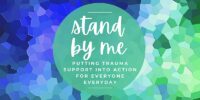Putting Trauma Support Into Action for Everyone, Everyday

with Ginny Focht New, Ph.D., PMH-CNS, BCB, NADD-CC
Length: 3 episodes, each 1 hr.
Trauma and its impact have increasingly been the focus of much attention. It is clear that trauma is often the root cause for actions and emotions that are difficult to understand in people. Although many practitioners and caregivers are gaining in experience in recognizing trauma, many people overlook the effects of trauma on the lives of our most vulnerable individuals, people with disabilities, children, homeless individual etc.
This three-part offering will provide an overview of the impact of trauma along with ideas about how to integrate supports into a person’s everyday life.
These lessons will explore:
• Why studying trauma is relevant to our work
• What constitutes trauma
• The effects of trauma on the person emotionally, socially, psychologically, and physically
• There will be an emphasis on ways to therapeutically support an individual in their everyday life
This training is a precursor for more in-depth training about trauma.
About the Presenter:
Dr. Ginny Focht-New is currently a Clinical Associate Professor and the Clinical Director for the Clinical Services for Vulnerable Adults clinic at Widener University. She is a certified psychiatric clinical nurse specialist with an additional certification in biofeedback and with the NADD. Ginny has been teaching social worker students since 2006. Her courses range from research, interpersonal processes, treating trauma, to assessment and diagnosis of mental health conditions and working with people with intellectual/developmental disabilities.
In addition, Ginny has supported people with intellectual/developmental disabilities (ID) in several capacities for 50 years.
Most recently she has provided consultation in several states. Ginny has been a therapist for almost 30 years. She has also provided legal expertise, has numerous presentations, and also has publications in a variety of journals.